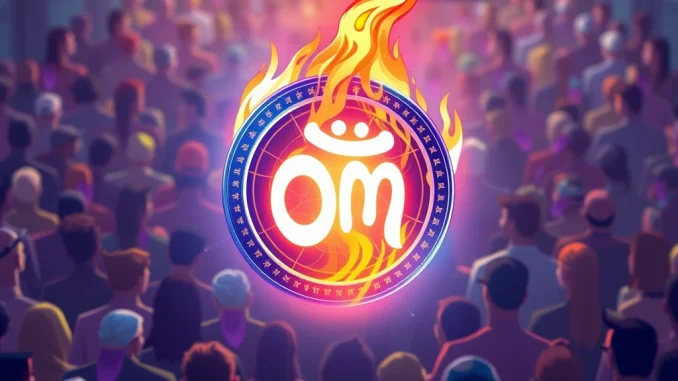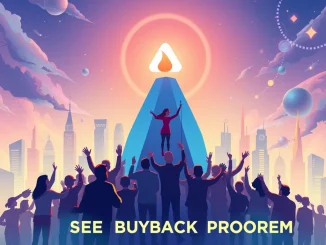
Exciting developments are brewing in the Mantra ecosystem! CEO John Patrick Mullin is taking a bold step towards greater decentralization and community empowerment. He’s putting the future of his significant stash of team-allocated OM tokens directly into the hands of the Mantra community. Let’s dive into this intriguing situation and explore what it means for OM token holders and the broader crypto space.
Why is the Mantra CEO considering a Token Burn?
John Patrick Mullin, the CEO of Mantra, has publicly stated his intention to burn all 772,081 of his team-allocated OM tokens. These tokens are currently staked on Fluxtra, and their fate is now the subject of community-wide discussion. This move signifies a commitment to reducing the circulating supply of OM tokens, which could potentially benefit the token’s value and decentralization efforts. But why this sudden shift, and what are the options on the table?
Seeking Community Input: A New Era of Crypto Governance?
In a refreshing display of transparency and community-centric leadership, Mullin has turned to X (formerly Twitter) to gather feedback. He’s presented four distinct options to the OM community, emphasizing that this poll is a “temperature check” to understand community sentiment, not a binding vote. This approach highlights the growing importance of crypto governance and the increasing influence of token holders in shaping the future of blockchain projects.
What are the Options for the OM Tokens?
Mullin laid out four potential paths forward for his OM tokens, each with its own implications for the Mantra ecosystem:
- Immediate Token Burn: The most radical option, this would involve immediately destroying all 772,081 OM tokens.
- Extended Vesting Period: This option suggests locking the tokens for an extended period, potentially years beyond the original vesting schedule.
- Community Multisig Wallet: Placing the tokens in a multisignature wallet controlled by the community, allowing for decentralized decision-making on their future use.
- Milestone-Based Unlock: Releasing the tokens gradually based on the achievement of specific milestones within the Mantra project.
Let’s break down each option and consider the potential benefits and challenges:
Option 1: Immediate Token Burn – A Bold Move?
Burning the tokens immediately is arguably the most impactful and decisive option.

Potential Benefits:
- Reduced Supply: Burning tokens directly reduces the total and circulating supply of OM, potentially increasing scarcity and value for existing holders.
- Strong Signal: It sends a powerful message about Mullin’s commitment to the project’s long-term success and decentralization, sacrificing personal gain for the greater good of the community.
- Price Impact: Historically, token burns have often had a positive impact on token prices due to decreased supply and increased investor confidence.
Potential Challenges:
- Lost Opportunity: Burning the tokens eliminates any potential future use for development, community rewards, or strategic partnerships, if those were considered down the line.
- Irreversible Action: Token burns are irreversible. Once burned, the tokens are permanently removed from circulation.
Option 2: Extending the Vesting Period – Playing the Long Game?
Extending the vesting period is a more conservative approach. It maintains the tokens within Mullin’s control for now but delays their potential entry into circulation.

Potential Benefits:
- Future Flexibility: It retains optionality. Mullin could potentially decide to burn, distribute, or use the tokens strategically at a later date, based on project needs and community consensus.
- Reduced Immediate Impact: It avoids any immediate market shock or volatility that a large token burn might cause.
- Long-Term Alignment: Extending vesting could further align Mullin’s incentives with the long-term success of Mantra, as he benefits only if the project thrives over an extended period.
Potential Challenges:
- Delayed Gratification (for community): The community may perceive this as a less decisive action compared to an immediate burn, potentially dampening enthusiasm.
- Uncertainty Remains: The future of the tokens is still not definitively resolved, leaving some lingering uncertainty.
Option 3: Community Multisig Wallet – True Decentralization in Action?
Placing the tokens in a community-controlled multisig wallet represents a significant step towards decentralization and participatory governance.

Potential Benefits:
- Empowered Community: It directly empowers the OM community by giving them collective control over a substantial number of tokens.
- Transparency and Trust: Multisig wallets are transparent and require multiple signatures for transactions, enhancing trust and security.
- Innovative Use Cases: The community could decide to use these tokens for various initiatives, such as grants, ecosystem development, marketing, or even future token burns, decided collectively.
Potential Challenges:
- Governance Complexity: Establishing and managing a community multisig wallet requires robust governance mechanisms and decision-making processes, which can be complex to implement and maintain.
- Potential for Disagreement: Community decisions can be slower and potentially lead to disagreements or conflicts regarding token usage.
- Security Risks: While multisig wallets enhance security, they are not immune to risks, and careful selection of signers and security protocols are crucial.
Option 4: Milestone-Based Unlock – Rewarding Progress?
Unlocking tokens based on milestones ties token release to the tangible progress and success of the Mantra project.

Potential Benefits:
- Incentivized Growth: It aligns token unlocks with project achievements, incentivizing the team and community to work towards specific goals.
- Gradual Release: A phased unlock mitigates potential market shocks and allows for a more controlled distribution of tokens.
- Measurable Progress: Milestones provide clear, measurable benchmarks for progress, fostering transparency and accountability.
Potential Challenges:
- Milestone Definition: Defining appropriate and meaningful milestones can be challenging and may be subject to debate.
- Potential for Delay: If milestones are not met on time, token unlocks could be delayed, potentially causing frustration or uncertainty.
- Complexity in Implementation: Setting up and managing a milestone-based unlock mechanism requires careful planning and execution.
What’s Next for the OM Token and Mantra Community?
The community input phase is crucial. OM token holders are encouraged to participate in the discussions and express their preferences. Mullin’s willingness to engage with the community on such a significant decision sets a positive precedent for crypto governance and highlights the growing power of decentralized communities.
The ultimate decision on the fate of these OM tokens will have a significant impact on the Mantra ecosystem. Whether it’s a dramatic token burn, a strategic long-term vesting plan, community-led governance, or milestone-driven unlocks, the outcome will shape the future of Mantra and its relationship with its community.
Conclusion: A Testament to Decentralization
John Patrick Mullin’s decision to seek community feedback on his team-allocated OM tokens is a powerful example of decentralization in action. It demonstrates a shift towards more inclusive and participatory models of crypto governance, where the community plays a vital role in shaping the direction of projects. This situation is a crucial one to watch, as it could set a new standard for how crypto projects engage with their communities and manage token distribution in the future. Stay tuned for updates as the Mantra community weighs in and this exciting story unfolds!



